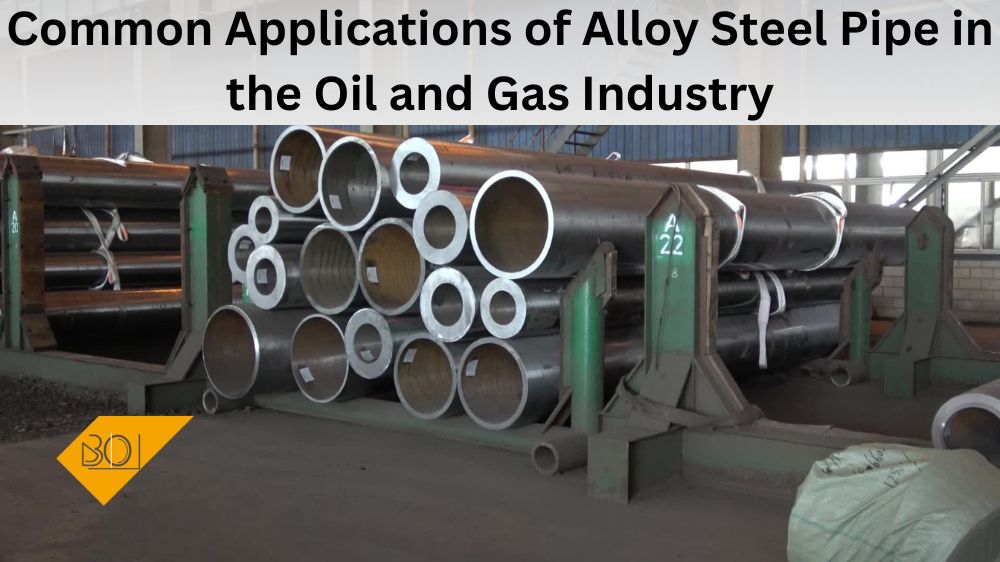Alloy steel pipes are especially useful in the oil and gas industry due to their strength, high corrosion resistance, wear and tear resistance, durability, and superior weldability. They are used for a wide range of applications, including oil & gas pipelines, refinery equipment such as heaters and boilers, offshore production platforms, sea lines of communication (SLOC) pipelines like submarine pipelines for transporting natural gas/crude oil/petroleum products from land-based refineries to the offshore platforms or rigs. In addition, alloy steel pipes offer excellent protection against harsh elements like seawater corrosion or temperature change that can cause serious damage or failure of systems carrying these fluids. Thus they help maintain uninterrupted operations in extreme conditions, which makes them the preferred choice anytime reliability is crucial.
What is Alloy Steel Pipe?
Alloy Steel Pipe is a Steel Pipe Composed of Alloying elements, such as manganese, chromium, nickel and copper. This type of pipe is known for its superior tensile strength and excellent corrosion resistance properties. It can withstand higher temperatures and pressures than regular carbon steel pipes. It is also highly resistant to many different corrosion environments, making it an ideal material choice for various industries, including construction and transportation. These properties make Alloy Steel Pipes perfect for applications where durability and reliability are essential.
Applications of Alloy Steel Pipe?
Drilling Operations:
In the oil and gas industry, drilling operations usually occur miles beneath the earth’s surface, where the conditions are harsh and extreme. Alloy Steel Pipe is preferred for drilling operations due to its high strength, durability and corrosion resistance. Alloy steel pipes come in various grades to accommodate varying drilling conditions, ranging from mild to corrosive environments such as sour gas wells. Additionally, alloy steel pipes are highly flexible, making them ideal for deviated and horizontal well completions.
Oil and Gas transportation:
After drilling, the extracted crude oil and natural gas need to be transported to refineries and processing plants for further purification or transport to consumers. The transportation process usually covers thousands of miles through pipelines or tankers. Alloy steel pipes offer strength, corrosion resistance, and long-term durability. The pipes are engineered to withstand extreme pressures and temperature changes, ensuring that the fuel is transported safely to its destination.
Refining and Processing:
Refineries and processing plants use advanced technologies to convert crude oil and natural gas into usable products. The process involves heating crude oil in kilns and distilling it through complex multi-phase separation processes. The refinery industry uses alloy steel pipes extensively due to their excellent high-temperature and heat-transfer characteristics. Additionally, the pipes’ corrosion resistance helps prevent contamination of the refined products by foreign matter, ensuring the final products’ purity.
Pipelines Maintenance:
With the oil and gas industry pipelines spread across vast lands and waters, their maintenance is crucial for efficient and safe operations. The pipelines require regular inspections to ensure they are performing optimally and to detect any leaks or damage that may compromise their integrity. Alloy steel pipes are preferred for pipeline maintenance due to their flexibility, high strength, and ease of installation. The pipes come in different diameters and lengths, making it easier to replace any damaged sections in case of need.
Offshore oil drilling and pipelines:
The oil and gas industry has expanded its operations into offshore drilling and pipelines, which presents unique challenges that require robust materials. Offshore drilling and pipelines face harsh environmental conditions, such as corrosive ocean water, high winds, and waves. Alloy steel pipes’ excellent corrosion resistance properties and high strength make them ideal materials for these applications. The pipes undergo rigorous testing to withstand harsh offshore environments, ensuring uninterrupted production.
Conclusion:
The oil and gas industry demands robust and versatile materials that can withstand harsh environments while maintaining high-performance standards continually. Alloy steel pipes have become a critical material in the oil and gas industry due to their high strength, corrosion resistance, and durability. These versatile pipes are useful in various applications, ranging from drilling operations, transportation, refining, processing, and maintenance to offshore drilling and pipelines. As the oil and gas industry continues to evolve, the demand for alloy steel pipes is expected to grow, ensuring operational efficiency and safety.

